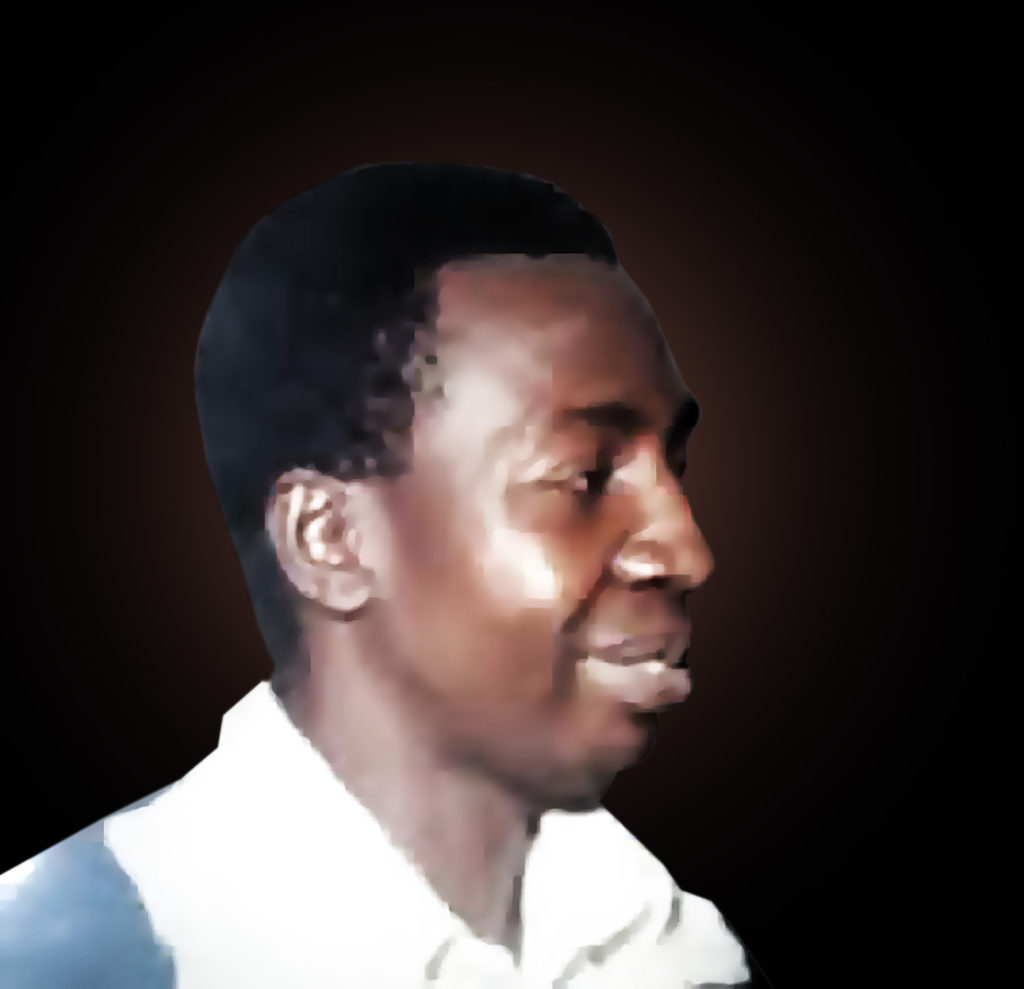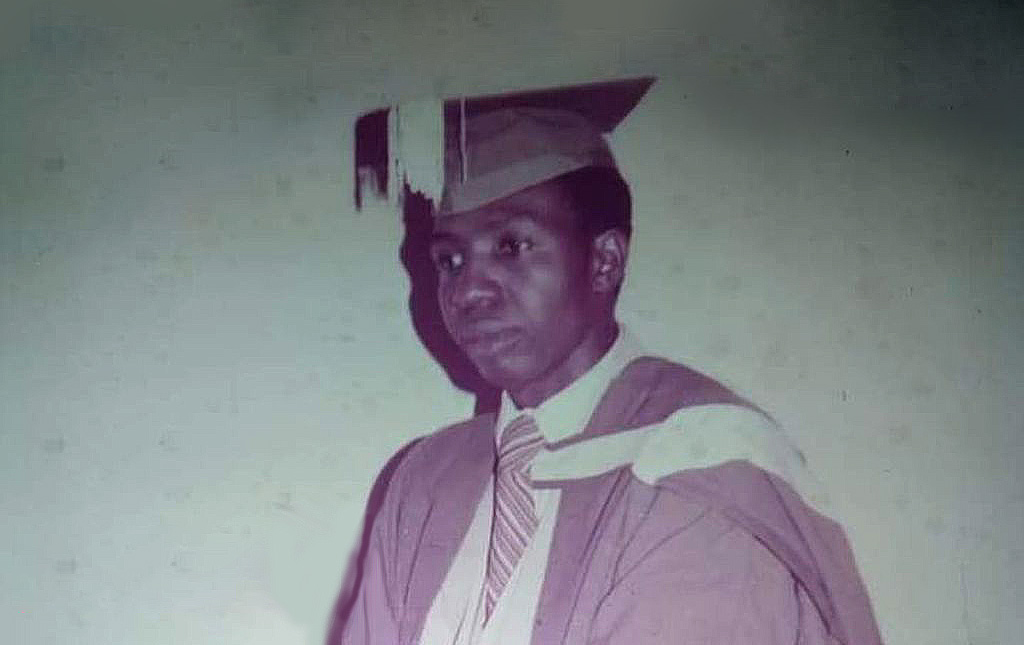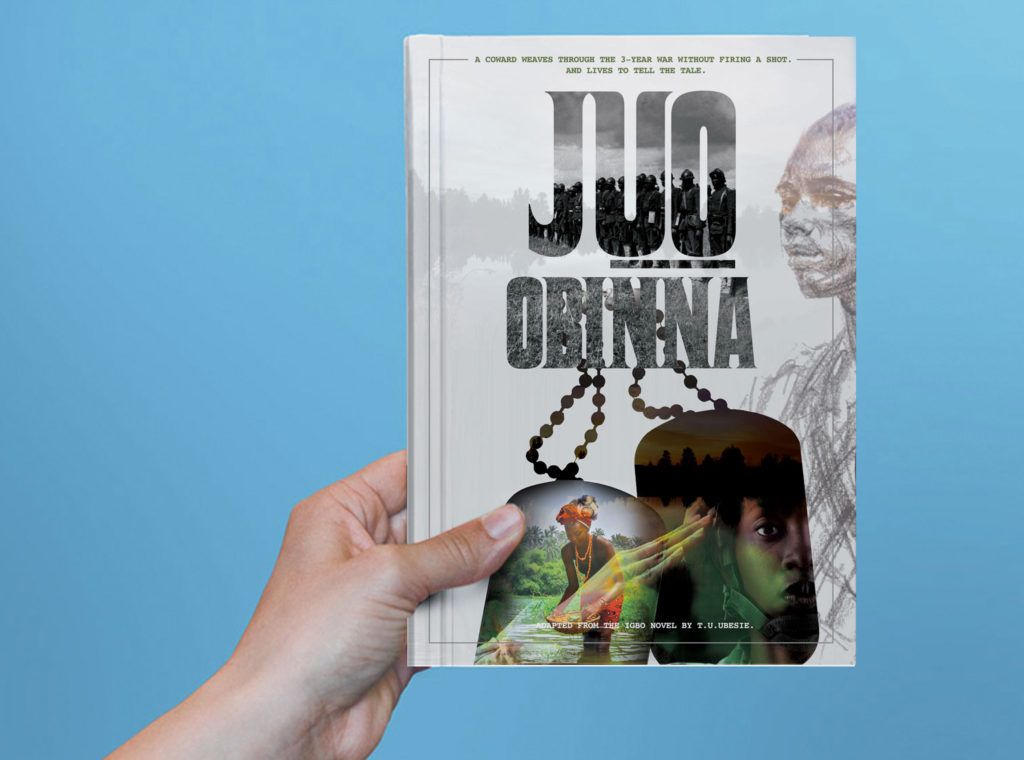The Author
11th February 2020, marked 26 years of the passing of Anthony Uchenna Ubesie. He was aged 44. Born 1950 in Achi, Oji-River LGA of Enugu State, a renowned Igbo language Novelist, Poet, Broadcaster and Cultural activist. He attended University of Nigeria, Nsukka from 1976-1980. He had over 13 Igbo novels to his name. He was a father of five.

Ubesie has an excellent mastery of the Igbo language usage, which makes his writing easy and fascinating to read. His sense of humour totally captivates the reader. His use of sophisticated irony leaves the reader musing about the motives of human behaviour in complex situations.
Tony Ubesie was clearly processed and possessed a consciousness before he took to writing in Igbo. Thematically, one could speak of Ubesie’s innovation in what he did with such concerns as selfhood and personal worth. In this war novel, for instance, he concerns himself not with the lament of the massive distinction brought about by the civil war, not with who is right or wrong, as is observable in much of Nigerian war fiction, but with the intimate and familiar gains and losses in honour, prestige, decency and integrity by individuals.
Ubesie is as indispensable in Igbo written literature as the tortoise is in Igbo folktales. His craftsmanship has earned him repute among Igbo literary scholars. This uniqueness stems from his handling of themes, language, characterization and other stylistic devices. Though his novels are Igbo in origin and setting, their themes are relevant to the universal phenomenon. The themes and techniques in Ubesie’s novels are embodiments of naturalness. Tony Ubesie himself is an architect of cultural ideology who portrays many cultural themes. He is also a novelist who in spite of his setting in Igbo land, moves from the belief of traditional and communal concepts of Igbo life to universal issues. His novels can be grouped with the work of social realists.

For his ability to weave between traditionalism- the exaggerated respect for tradition, used to connote the transmission of cultural continuity, beliefs, and legends and to modernism, a late 19th century movement seeking to harmonize traditional beliefs with modern scientific and philosophic thoughts, Ezikeojiaku. (2001:49) describes the author in the following words: …of all modern creative writers, Tony Ubesie is undoubtedly the most polyvalent.
Some of his works before his tragic passing in a car crash at Mmaku, Awgu, Enugu State, in 1994 include:
Ukwa Ruo Oge Ya O Daa
Mmiri Qku E Ji Egbu Mbe
Ukpana Okpoko Buuru
Isi Akwu Dara N’Ala,
Ukpaka Mmiiri Onye Ubiam and
Juo Obinna.
Jụọ Obinna
Jụọ Obinna, a 175-page comical story-telling about the Nigeria Civil War was published in 1977 by Oxford University Press. ISBN-13: 978-0-19-575395-0, ISBN: 0-19-575395-X
In this novel, Tonu Ubesie presents to the us a a round and intense character – a braggart and cowardly Obinna. Morbidly fearing of conscription into Biafran Army, he relies heavily on his intellect and a lot of luck to survive. His pretensions actually get him through the entire war. And he does not get to fire a shot!

The outbreak of war became the litmus test of valor. Obinna fails. However, he successfully dodged all combats in the war. Yet, he would pretend to have fought the war. Full of stories about the several battles, he is exposed by one who is in a position to know his intrigues. That man was the peacetime dibia, Maazi Onyido.
Incidentally, Obinna is caught escaping to Owere Ezukala, and most of the intrigues are offered through reflection and flashback. Tony Ubesie’s style is rich like a Frederick Forsythe or a Jeffery Archer or a Robert Ludlum in Igbo Language.
Not only are idioms aptly used in Juo Obinna, they also contain images of intense picturesqueness, which offer pleasure to the readers especially as they discover the equivalence between the situation, which prompted the idiom and the meaning of the idiom. In Jụọ Obinna, there are such idioms as Chi adịla ọbụ onye, ọbụ onye; Erimeri bụ atụrụ tawa; Anwụghị anwụ efughi efu, aga-akpọ ndụ ọkụ. Ubesie uses idioms to express extreme happiness. In other works, he has been known to describe different sounds of military armaments military armaments in constant usage during the Nigerian Civil war.
At the onset of the novel, Ubesie shows us a as a fearful Obinna who swore that he would rather be executed where his corpse will be found than be conscripted. This fear drove him to visit Maazị Ọnyido for a charm that will prevent the army boys from getting hold of him. He actually stole his mother’s last hen to take along on this fortification visit. Despite his efforts at evading the war front, Ubesie makes the reader appreciate the fact that they do this for different objectives. Obinna’s time of joining the army has a postponed realization.
The author puts Obinna’s objectives as follows: Mba! Chineke Ekwela! ọ bụghị ya ka a ga-akpụrụ jee n’ ihu ọgụ mgbọ na-egbu mmadụ ma ọchị ụmụagbọghọ chịrị mmadụ anaghị egbu egbu. Never! God forbid! He would not be the enlistee to be dragged to the war front only to be felled by bullets. Bullets kill but jeers from girls do not kill.
We are not left with any choice but laughter at the turn of events for the main character. The braggart Obinna had regaled the ladies with tales of how he would deal with the enemies. But as the guns begin to boom, he literally pees in his pants through the entire 175 pages. On another occasion, when he recovers from the bomb injuries at the hospital, he began to boast to the nurses how he fought at the front; that he sustained injuries were evidence of his valour. In the author’s words: Obinna ji ọgụ a na-alụ we nụọ iyi si oke ọ bụla ga-ejikọ ya na mmadụ na ndị soja onye ahụ kporo rie. Obinna swore with the raging war saying that he would forgo whatever benefits that would make him come in contact with soldiers.
Obinna made his stand on the war quite clear from the beginning of the war. In spite of his big mouth and beliefs in self-preservation, he sustains a first bullet wound as he goes to steal petrol for sale in the company of Ikechukwu. The second bullet when he went to grab bags of Stockfish the day the war ended. He also a robber.
The activities and character of Obinna overshadow those of other characters portrayed in Jụọ Obinna. The reader only meets them when they are used to achieve Obinna’s selfish ends, like helping him to evade conscription or making charms for him to evade war.
Obinna lies so much that readers at a point pities the young women, Nnenna and Ogbenyalu as each hinge her hope on marrying a young and brave army officer, as Obinna.
Ubesie does not present all categories of women as opportunists. And so, even though Obinna drowns Nnenna and Ogbenyalu in lies about his purported gallantry at the several fronts and loss of property at the end of the war, they are ready to accept him as he is and console him. They believe he speaks the truth. In Ubesie’s words, “Obinna, akụkọ a ị na akọ edoghi anya, gịnị na-azara gị ụgbọala sị, ụgbọala asịghị? Ọ bụghị ego zụtara ụgbọala? Ọ bụghị mmadx kpatara ego eji zụta ụgbọala? N nụrụ na ego naazụta mmadụ.
Translated, “Obinna what you are saying is not sensible. Why are you lamenting the loss of a car? Is it not a living human being that makes money to purchase a car? Have you ever heard that money is used in purchasing (the life) of a human being?
Maazị Ọnyịdo in Jụọ Obinna is presented as a traditional medicine man. He is used to represent the role of traditional medicine man in Igbo land during the civil war. In spite of the series of tests Obinna wears the charm Maazị Ọnyịdo prepared for him, it does not work.
Obinna is finally in the army’s net, conscripted despite all his antics at evading his largest singular dread. Maazị Ọnyịdo who prepared charms that enable folks evade conscription was equally caught. Maazị Ọnyịdo fulfilled his promise of informing Obinna of the time they will escape from Olo war front. A fake in peace time, Onyido proves trustworthy in wartime – he could have escaped without alerting Obinna. Maazị Ọnyịdo is presented asan even bigger trickster, crafting initiatives he and Obinna used to escape from the army officers that met them on the way. In his intelligence, he improvised with the blood of a chick on the bandage Obinna had used to feign a limb injury. This all the magic they needed.

In addition to Obinna’s fears of being by mortar, Ubesie explores themes of displacement and refugee crises. It is through refugee predicaments that the author paints the picture of the horrors of the Nigeria/Biafra War and wars in general. The novelist lets us into the lives of people in peacetime – joy and tranquillity and the opposite in wartime – as refugees. During the Civil war, people were dislocated from their homes with neither food nor money.
Professor Innocent Nwadike (2001:64) in his critique of Ubesie’s novels opines, “What distinguishes Ubesie a second-generation Igbo novelist from his counterparts and contemporaries is his style. He writes in such impeccable standard Igbo that it is difficult to distinguish his locality except in commentaries and personal authorial interruptions where he tells the reader that Achi is his home…Even though he has contributed some dialect words and expressions into the dynamic lexicon of standard Igbo, he is not a dialectal writer. He consistently adopts lexical borrowing and Igbonization strategies in enriching Igbo languages especially in the area of military jargons. Naturally, the novelist writes in pure standard Igbo but he adds dialect words creatively in order to enrich the Igbo language.
Furthermore, Ọnụekwusi (1981: 13), in his review of Jụọ Obinna states that “the language used in writing the novel is standard Igbo. Ubesie used many figurative expressions in order to describes his characters effectively.” Ubesie uses his novels as satiric medium. For instance, he narrates bad acts and at the same time brings out the failure of such victims
Prof. Nolue Emenanjọ (1982:58) states, “In a good deal of the available narratives, the language is too matter- of fact and too long. There is little or no originality in the way hackneyed proverbs and idioms are thrown at the reader. At times, one gets the impression that most writers of Igbo feel that the only way of writing good Igbo is by forcing proverbs down the throat of readers. Open the so-called novels and the number of proverbs is astonishing.
In response to this Kanu (2000:14) chides Ubesie’s use of proverbs for running afoul of Igbo proverb ethics: explaining them!
However, Nwadike (2001:72) is of the opinion that, “Leaving the proverbs without illustration and expansion within the context, the reader will not understand why it is used, he therefore extends the storyline with his illustration. Sọja ọ bụla e bu bịa n’ihu ọgụ bụ ọnwụ ka ọ bịara iche, mmadụ egbughi ya o gbuo mmadụ. (Any soldier that comes in the war front has come to wait for death. If somebody did not kill him, he will kill another”.) The above is in support of the need for explaining proverbs, which will assist the reader to comprehend the writer’s ideas and views. Apart from the above argument it can be seen that Ubesie’s stories are full of humuor even when he is narrating sad stories. At times his humorous style makes people cough even when the situation is tough. In agreement with this, Nwadike (2001:78) says this: One of Ubesie’s highly developed and powerful tool of art is his irony. He makes use of verbal and structural ironies, but more of the latter. The above excerpt goes to attest that Ubesie is a professional novelist.
Ubesie’s novels we observe that Ubesie uses many tones in narrating his stories such as advisory tone, derision, warning, disappointment, satiric, etc to correct and condemn some societal ills.
Ubesie is conscious of his art and worked hard at it. His use of language gives him an enviable quality which no other Igbo writer has. His use of language is devoid of ambiguity. His choices of words enable readers to easily understand him. Ubesie’s knowledgeable assemblage of words shows in his use of figurative language in the description of his character’s appearance, actions, inner feelings, values, and ordering of events. All these help to enhance the readers’ comprehension of the novels. Using, anecdotes, similes, proverbs, metaphors, personification, wit, humour, myths, prose rhythm, irony, imagery, and symbolism am so uniquely the reader is entrapped, confounded, and introspects at such literary dexterity, stylistic elegance, and uniqueness in approach.
We can state that Ubesie’s novels stimulate both pleasure and thought. The characters are, on the whole, sufficiently endowed with convincing attributes. His technique of writing and messages possess a serious challenge to other Igbo novelists.
Thus, Tony Ubesie is the eagle on the iroko as far as Igbo prose fiction is concerned, and he has achieved for Igbo novel what Achebe achieved in English prose fiction. Emenyeọnụ (1984:11) describes Ubesie as a very important contemporary Nigerian creative artist whose distinction as a writer lies in his stylistic innovations and thematic realism. He creates a fresh awareness to familiar themes and discusses them in relation to contemporary social and cultural issues in ways that demonstrate the author’s understanding of the varying themes…
Language is the wheel on which every literary work moves. Ubesie’s use of creative language can be seen in two ways: his use of existing possibilities within a language and when he goes beyond the established possibilities existing in a language.
Although Ubesie is deceased, he has assumed the form of immortality through his works, speaking to us in his famed melodious voice, his rhetoric, oratory and all.
Gone but not forgotten!
__________________________

